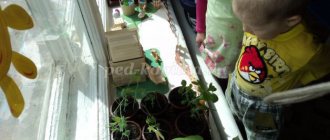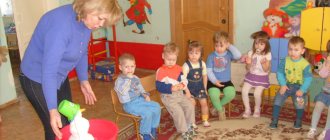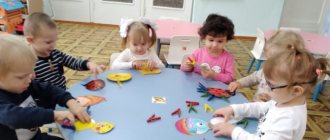Preparatory viewing:
“Plan of personal work with children of the 2nd junior group”
For January 2022
Attitude to work.
- D/ game “Help feed the doll” - learn to name dishes and food products.
- D/ game “Helpers” - learn to identify objects for various professions.
- D/ game “Show the picture” to teach how to determine what adults are doing.
- D/ game “dress the doll” - self-service and helping others.
- D/ game “Tools for work” - teach to recognize objects for work.
- D/exercise “Assignment” - learn to help adults and friends.
- D/ exercise “Where does garbage live?” - teach to maintain order and cleanliness.
- D/ game “Wonderful Bag” - learn to identify geometric shapes.
- D/game “Guests” - teach to identify many and one”
- D / game “Help the bear” - find high - low, wide - narrow.
- D/ game “Tracks” - one, many, counting up to 3.
- D/ game “Assemble a pyramid” - fixing color and size.
- D/ game “Stringing huge and small rings” - size and counting.
- D/ game “Building a tower from cubes” - size, color.
- Finger games.
- Games with geometric shapes - “Assemble a pattern, any object - a Christmas tree, etc.
- D/ game "Harvest" - count to 3.
- D/ game “Fly the ball” - up, down, on, under.
- D/ game “Colored sticks” - colors, placement on a sheet.
- D/ game “Balloons” - colors, shapes.
- D/ game “Collect a picture” - colors, shapes, placement.
- Mosaics, lacing, stencils, coloring books, crayons - development of small motor skills
- D/ exercises “Finish, add, add”, “pick up” - the skill of holding a brush or pencil correctly.
- D/ exercises “What’s extra” - development of attention.
- D/ game “What color is the car, doll” - color, parts, bodies.
- D/ game “Which” - distinguish and name colors
- D/ exercises “Drawing in the air” - development of the hand.
- Finger gymnastics, with objects.
- Evelina
- Sasha
- Ulyana
- Anya
- Ksenia
- Anita
D/ game “Wonderful Box” to expand the stock of understandable words.
D/ game “Show the picture” - distinguish details, reinforce correct pronunciation.
D/ game “Repeat the nursery rhyme, poem” - finish words, phrases, memorize.
D/ game “Water” - experience with objects and reinforcement of memorization of nursery rhymes.
D/ game “Repeat” - learn to create animal sounds.
D/ exercise “Guess what it sounds like” - sound pronunciation exercise.
D/ exercise “Toy Exhibition” - form an active vocabulary, repeat after an adult.
D/ game “Guess who came to us” - an exercise in sound pronunciation.
D / game “Guess and name” - the purpose of objects, to activate words.
D/ game “Recognize by voice” - sound pronunciation, imitation.
Card file (junior group) on the topic: Personal work with children of the 2nd junior group “December”.
2nd junior group.
Personal work in special moments.
Speech development, simple mathematical concepts, visual arts, reading fiction.
Methodology for individual work with children in the younger group
It is known that every child is unique. It has its own characteristics of the nervous system and psychophysical development. The individual characteristics of a child influence his acquisition of skills and abilities and his attitude towards others. Observation of a child in everyday life, analysis of his behavior and activities, conversations with parents allow the teacher to plan tasks, methods, and content of individual work.
Children who do not regularly attend kindergarten due to illness or other reasons, children who are “weakened”, have low performance in class, are shy, slow, inhibited and pedagogically neglected, need especially close attention. When planning individual work, the teacher must take into account the mental and individual characteristics of the child.
Individual work with children is carried out in the morning and evening hours, as well as during walks.
Individual lessons with children who have gaps in knowledge are recommended to be organized primarily in the form of a game. The play partner can be an adult or another child
In the first half of the day, the teacher does a lot of individual work with the kids. For example, he organizes special games and exercises with those who need to correct speech deficiencies or who are lagging behind in any movements. He works with inactive and withdrawn children, giving them various assignments that require communication with adults and peers. Children who are not inquisitive enough are entrusted with interesting observations (for example, how a hamster eats and puts grains in its cheeks, tits that have flown to the site, admiring the beauty of a winter morning, etc.).
In the afternoon, the teacher conducts individual work with children on the development of movements, drawing, cutting, designing, and correcting speech defects.
During walks, the teacher conducts individual work with children: for some, he organizes a game with a ball, throwing at a target, for others - a balance exercise, for others - jumping from tree stumps, stepping over trees, running down hills. During walks, work is also done to develop the child’s speech: learning a nursery rhyme or a short poem, reinforcing a difficult sound to pronounce, etc. The teacher can recall with the children the words and melody of a song that they learned in a music lesson.
Methods of individual training in the junior group :
- Using an example, following the example of a teacher;
- In interaction with the teacher;
- Modeled after peers;
- Using the help of peers;
- On the recommendation of narrow specialists.
The form of organization of work is individual, however, in some cases it is possible to carry out work by organizing children into small groups. When carrying out individual work on a walk, it is necessary to take into account seasonality and weather conditions. Individual work with children during regime processes is planned (education of cultural and hygienic skills, independence, development of speech, movements, etc.) and is conducted by the teacher throughout the day, in all regime moments, in any type of activity.
The quality of individual work depends on the teacher’s ability to “see” children. The emotional state of the child during classes is very important. And here the role of the adult is great. The psychological and emotional mood of the classes depends only on him. A smile, encouragement, and sincere interest in what the adult is teaching the child will create the background against which the child will have a desire to learn. When working with children, I advise reading poetry, asking riddles, and using elements of dramatization. In addition to the aesthetic and cognitive value for the child, this creates the right atmosphere, relieves tension and will allow both you and the child to use class time more effectively.
ANNEX 1
An example of planning individual work at special times in a junior group for a week.
MONDAY
.
Morning time.
1. Collective and individual conversations with children to develop speech activity and enrich the vocabulary of preschoolers.
2. Mastering the basics of hygienic culture: Washing, behavior at the table, dressing, in a playful way, caring for things and toys. in independent activities.
3. Outdoor games of low and medium activity.
4. Working with fairy tales - repeating previously read fairy tales, reading a new fairy tale, watching a cartoon based on a read fairy tale, looking at illustrations of a famous fairy tale. -a new ending to the fairy tale, adding new heroes to the fairy tale, how to help the hero of the fairy tale, etc.
Walk
1. Observation of wildlife.
2. Individual work to develop creative abilities (collect the most beautiful autumn bouquet, what does a cloud look like?, show how a fox walks, etc.).
3. Organize collective gaming activities.
Evening time.
1. Labor education - familiarization with the work of adults (various forms of work).
2. Plot-role-playing game. To develop skills and desire to participate in gaming activities.
3. Preparing for a math lesson.
TUESDAY
.
Morning time.
1 Introduction to the objective world: an idea of objects, their name, structure, names of parts, purpose, how and where they can be used: clothes, shoes, furniture, toys, transport, vegetables, fruits, etc. cognitive and speech skills, attitude to the objective world.1. Mastering the basics of work. Self-service, development of work skills in everyday life, attitude to work.
2. Individual exercises in appliqué, drawing and sculpting.
3. Inspection of the kindergarten premises, examination of furnishings, household items, getting to know the preschool educational institution employees and their professions.
Walk.
1. Observation of inanimate nature.
2. Individual work with children on speech development.
3. Introducing a new outdoor game.
4. Develop children's gaming skills.
Evening time .
1. Listening to musical children's works: songs, musical fairy tales, musical fragments from cartoons.
2. Child and book - reading, retelling, looking at new books, folders with pictures, albums, helping the teacher repair books.
3. Game activity: outdoor games with text, round dance (we develop tempo, rhythm, teach onomatopoeia).
4. Individual work with children (psychological relief, overcoming emotional discomfort).
WEDNESDAY.
Morning time.
1. Formation of the foundations of environmental education, plant world - name, plant characteristics, growth and development, comparative analysis, plant care, - animal world - name, general concepts, structure, relative size, location, needs, care. - a friendly attitude towards all living things.
2. Games with construction sets to develop finger motor skills.
3. Individual work to develop hygiene skills (play activities).
4. Memorization, consolidation and repetition of poems, nursery rhymes, songs, counting rhymes, riddles.
Walk.
Thematic walk (at the choice of the teacher, at the request of the children, according to the program). Conversation, story or observation in accordance with the topic. Organization of outdoor activities in accordance with the teacher’s tasks (walking, outdoor themed games, consolidation of motor skills). Use imitation games, facial exercises, miniature games (mini theater).
Evening time.
1. Entertainment: -concerts, meetings with older children, -puppet, table, shadow theatres, -sports activities, -mask festival, -celebration with parents.
2. Introducing and explaining the rules of a new board game for the development of speech, sensory, and logic.
3. Individual work to develop intellectual abilities.
THURSDAY.
Morning time.
1. Cognitive development: Adults give concepts and comparative analysis, Children form an emotional state, I myself develop practical skills. My family
2. Collective exercises in applique, modeling, drawing in joint activities of an adult and a child.
3. Work in a corner of nature.
4. Consolidation of dance and motor skills using musical accompaniment.
Walk.
Getting to know society. Hiking around the neighborhood. Conversations “My street”, “My kindergarten”, “Shop” “Road” (familiarization with the phenomena of social life). Individual work on orientation in time and space.
Evening time.
1. Familiarity with the rules of the road. The first rules for life safety
2. Individual outdoor play activity with objects (hoop, ball, chair, handkerchief, etc.)
3. Gaming activities: HRE, gaming skills, learning dialogues, gaming situations.
4. Preparing for the next day's classes.
FRIDAY
.
Morning time.
1. Exhibition of children's works in fine arts, examination of crafts made from natural materials, and, if necessary, complete the collective work.
2. Consolidation of motor skills: construction, restructuring, rhythmic exercises, basic movements. To develop in children a desire to play sports, correct posture, and precise execution of commands.
3. Formation of moral qualities through the creation of play situations with dolls and toys.
4. Development of intellectual abilities - games, tasks.
Walk.
Observing people. Adult labor. Age characteristics. Communication culture. Relationships with older preschoolers. Mobile activities at the request of children. Individual consolidation of knowledge on the development of coherent speech, vocabulary development, and grammatically correct speech.
Evening time.
1. Games with sand and water
2. Construction with large cubes, cubes, Lego constructor.
3. Play activities at the request of children.
4.Creating conditions for gaming activities (GRI).
APPENDIX 2
Cyclogram of individual work with children of the younger group


